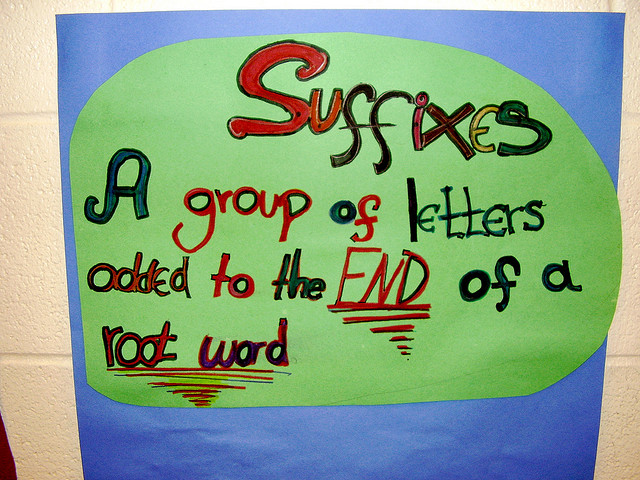There is something very interesting about English language. Many a times you can change the meaning of a word by adding a group of letters after it. Yes, that is true! Just add a letter or more and change the meaning! This group of one or more letters and is known as a suffix.
The easiest suffix that we use and probably don’t even know of it as a suffix is the letter ‘s’. When added to a word, it changes the word from a singular to a plural. Look at this.
Car + s -> cars, hand + s -> hands, clown + s -> clowns.
The word that the suffix is being added to is called the root or base word.

So you see suffix when added to the root word alters its meaning. Let’s explore some of the most common used suffixes in the language. Are you ready?
Have you ever noticed ‘er’ in teacher, gardener, cleaner, printer, fighter, reporter, player, designer? ‘Er’ happens to be a suffix. Can you guess how it changes the meaning of the root word? When you add ‘er’ to the end of a word, it becomes a new word meaning person or a thing that is connected with the root word.
An ‘ed’ or ‘ing’ suffix changes the form of the verb. ‘Ed’ changes the verb to past tense while ‘ing’ changes it to present participle. In these cases, adding a suffix changes the spelling of the base word and there are some rules about it. Here are some rules.
Mostly when a verb that ends in a consonant + verb + consonant pattern, the final consonant is doubled. You will understand better with a few examples.
Run + ing -> running, Beg + ing -> begging, sit + ing -> sitting
When a verb ends in ‘-ic’ we add ‘-k’ and then ‘-ing’:
Panic + ing -> Panicking
When a verb ends in silent ‘-e’, the silent ‘-e’ is dropped, and ‘-ing’ is added:
Close + ing -> closing, live + ing – > living
However, when a verb ends in an ‘-e’ which is not silent, the final ‘-e’ is not dropped before the ending ‘-ing’ is added.
See + ing -> seeing
When a verb ends in ‘-ie’, the ‘-ie’ is changed to ‘-y’ before the ending ‘-ing’ is added:
Die + ing -> Dying, tie + ing -> tying
Another very interesting suffix is ‘less’. Actually it’s a mean suffix ;) It rips of the root word of its quality. So price becomes priceless and ruth becomes ruthless. Heartless, fearless, shameless are some more examples with this suffix.
There are a large number of suffixes in English language. We have just touched the tip of the iceberg. Can you guys tell us about some of them?





Leave a Reply